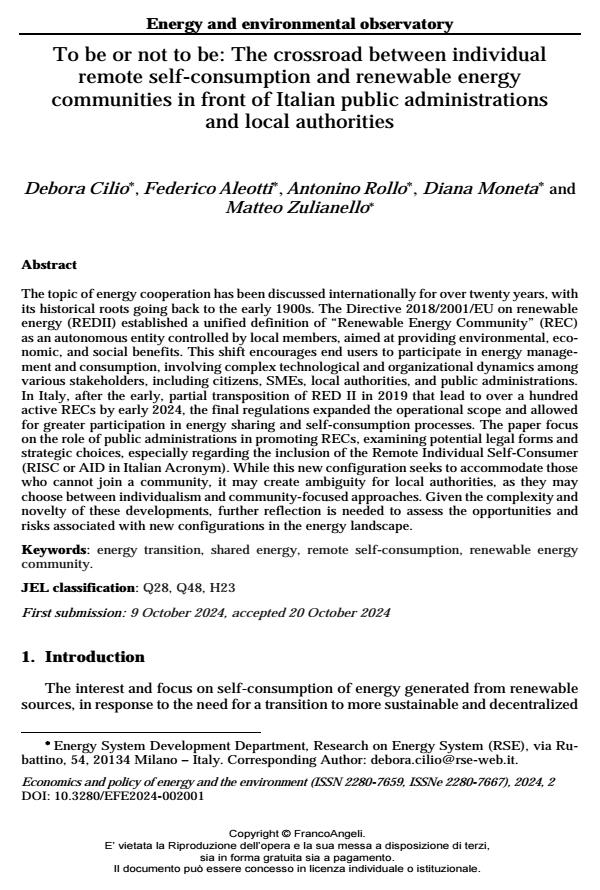To be or not to be: The crossroad between individual remote self-consumption and renewable energy communities in front of Italian public administrations and local authorities
Titolo Rivista ECONOMICS AND POLICY OF ENERGY AND THE ENVIRONMENT
Autori/Curatori Debora Cilio, Federico Aleotti, Antonino Rollo, Diana Moneta, Matteo Zulianello
Anno di pubblicazione 2024 Fascicolo 2024/2
Lingua Inglese Numero pagine 31 P. 5-35 Dimensione file 473 KB
DOI 10.3280/EFE2024-002001
Il DOI è il codice a barre della proprietà intellettuale: per saperne di più
clicca qui
Qui sotto puoi vedere in anteprima la prima pagina di questo articolo.
Se questo articolo ti interessa, lo puoi acquistare (e scaricare in formato pdf) seguendo le facili indicazioni per acquistare il download credit. Acquista Download Credits per scaricare questo Articolo in formato PDF

FrancoAngeli è membro della Publishers International Linking Association, Inc (PILA), associazione indipendente e non profit per facilitare (attraverso i servizi tecnologici implementati da CrossRef.org) l’accesso degli studiosi ai contenuti digitali nelle pubblicazioni professionali e scientifiche.
The topic of energy cooperation has been discussed internationally for over twenty years, with its historical roots going back to the early 1900s. The Directive 2018/2001/EU on renewable energy (REDII) established a unified definition of “Renewable Energy Community” (REC) as an autonomous entity controlled by local members, aimed at providing environmental, economic, and social benefits. This shift encourages end users to participate in energy management and consumption, involving complex technological and organizational dynamics among various stakeholders, including citizens, SMEs, local authorities, and public administrations. In Italy, after the early, partial transposition of RED II in 2019 that lead to over a hundred active RECs by early 2024, the final regulations expanded the operational scope and allowed for greater participation in energy sharing and self-consumption processes. The paper focus on the role of public administrations in promoting RECs, examining potential legal forms and strategic choices, especially regarding the inclusion of the Remote Individual Self-Consumer (RISC or AID in Italian Acronym). While this new configuration seeks to accommodate those who cannot join a community, it may create ambiguity for local authorities, as they may choose between individualism and community-focused approaches. Given the complexity and novelty of these developments, further reflection is needed to assess the opportunities and risks associated with new configurations in the energy landscape.
Parole chiave:energy transition, shared energy, remote self-consumption, renewable energy community.
Jel codes:Q28, Q48, H23
Debora Cilio, Federico Aleotti, Antonino Rollo, Diana Moneta, Matteo Zulianello, To be or not to be: The crossroad between individual remote self-consumption and renewable energy communities in front of Italian public administrations and local authorities in "ECONOMICS AND POLICY OF ENERGY AND THE ENVIRONMENT" 2/2024, pp 5-35, DOI: 10.3280/EFE2024-002001